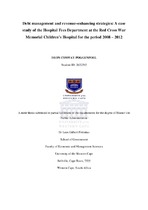| dc.description.abstract | Red Cross War Memorial Children’s Hospital (RCWMCH), located in Cape Town,
South Africa, is the only hospital in sub-Saharan Africa dedicated to children. It renders world–class public health-care services to sick children; 95% of which come from the poor, local and distant communities and require specialised treatment to recover. This case study aims to explore the factors associated with debt management and revenue-enhancing strategies in the Hospital Fees Department (HFD). The primary objective of the study is to examine the way in which the hospital manages outstanding debt and identify different empirical methods to improve revenue collection. In order to ensure the cost recovery of services, members of the public are billed and the expectation is, of course, for the bills to be paid. The hospital has a Hospital Information System (HIS) in place that consists of Clinicom and the Accounts Receivable System (ARS). The business design of Clinicom ensures that patient information is recorded and billed correctly. The ARS, on the other hand, ensures the collection of debt and reconciliation of state funds. The reason for choosing the HFD is that this component influences service delivery and funding. The importance of cost recovery to improve service delivery coincides with the Constitution of the Republic of South Africa and it is for this reason that people have the right to basic services. By making for sure revenues are collected, it ensures that the improved health-care services, to which they are entitled, are delivered to members of the public at the RCWMCH. The primary approach employed to collect information is made using structured questions and interviews with the members of the public and the RCWMCH management. The secondary approach is through the use of books in the field of finance, the HFD annual reports and policies. The study concludes with findings and makes recommendations to the RCWMCH management, the South African government and the academic arena at large. The researched information can be used as a tool to manage outstanding debt and improve revenue collection for the RCWMCH and other hospitals that face similar circumstances. | en_US |

